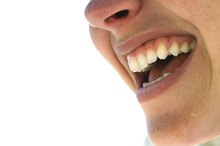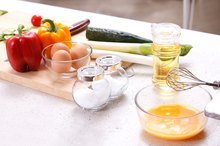Can Swishing Salt Water in the Mouth Raise Blood Pressure?
A warm glass of salt water remains a classic, all-natural home remedy to cope with a sore throat or toothache. Yet people with high blood pressure may be concerned about the sodium content in these solutions. For most people, salt water mouth rinses won’t raise blood pressure because the formula is for gargling or rinsing, rather than swallowing. Always ask your doctor, however, to verify the safety of herbal or natural treatments before you try them.
Sodium and Hypertension
Failing to control your sodium intake increases your risk of developing high blood pressure, or hypertension. Hypertension can lead to strokes, blindness or organ damage. According to the U.S. Department of Health and Human Services, the average adult consumes 3,750 milligrams of sodium each day, largely from salty processed foods and using too much table salt 2. Yet 2,300 milligrams of sodium is a healthier intake, with 1,500 milligrams representing the ideal maximum for people who need to decrease their blood pressure significantly.
- Failing to control your sodium intake increases your risk of developing high blood pressure, or hypertension.
- Yet 2,300 milligrams of sodium is a healthier intake, with 1,500 milligrams representing the ideal maximum for people who need to decrease their blood pressure significantly.
Concern
What Causes a Soapy Taste in the Mouth?
Learn More
Your doctor may recommend you use a salt water rinse if you have a toothache or a sore throat. For some people, warm salt water may be all that is needed to ease pain and swelling, or can be a helpful stopgap until you can see a professional. Salt water rinses contain as much as 1 tablespoon of table salt in every 6 to 8 ounces of water. Technically, this solution contains almost 7,000 milligrams of sodium, or about five times more sodium than someone with hypertension should have for the entire day.
- Your doctor may recommend you use a salt water rinse if you have a toothache or a sore throat.
- For some people, warm salt water may be all that is needed to ease pain and swelling, or can be a helpful stopgap until you can see a professional.
Reality
Because salt water mouth rinses aren’t meant to be swallowed, you will receive only trace amounts of the mineral by “swishing” and spitting out the salty solution. In fact, salt water rinses are better choices for people watching their high blood pressure than cold medicines. Some over-the-counter cough and cold syrups, which require swallowing, can dilate your blood vessels to a dangerous extent. If you have hypertension and your main cold symptom is a scratchy or aching throat, gargling with salt water is preferable to some medications.
- Because salt water mouth rinses aren’t meant to be swallowed, you will receive only trace amounts of the mineral by “swishing” and spitting out the salty solution.
Methods
The Best Ways to Water Clean Teeth
Learn More
Your doctor or dentist may suggest how much salt to add to a glass of warm water. Formulas vary from one-half teaspoon to 1 tablespoon. The water should be no hotter than coffee or tea. To soothe a sore throat, sip some salt water, hold it in your mouth, tilt your head back slightly and gargle. Spit the salt water into a sink and repeat the process, if desired. For a toothache, sip warm hot water and direct the water to the area that aches. Hold until the water cools, spit the water into the sink and repeat the process several times. You can repeat the salt water treatment three or four times a day. Always use a clean glass to avoid re-introducing germs into your vulnerable system.
- Your doctor or dentist may suggest how much salt to add to a glass of warm water.
- For a toothache, sip warm hot water and direct the water to the area that aches.
Related Articles
References
- University of Rochester Medical Center: Cough Medicine Abuse by Teens
- U.S. Department of Health and Human Services: Your Guide to Lowering Blood Pressure With DASH
- Food and Drug Administration, Center for Food Safety and Applied Nutrition. You May Be Surprised by How Much Salt You're Eating. Consumer Updates, 2016
- Sea salt vs. table salt, Break Up with Salt. American Heart Association.
Writer Bio
Ellen Douglas has written on food, gardening, education and the arts since 1992. Douglas has worked as a staff reporter for the Lakeville Journal newspaper group. Previously, she served as a communication specialist in the nonprofit field. She received her Bachelor of Arts from the University of Connecticut.








